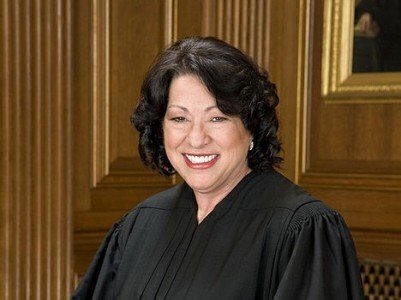In an 8-1 decision, the United States Supreme Court has ruled against Florida’s capital punishment scheme, which says that judges have the power to determine facts in death penalty cases.
 Writing for the majority, Associate Justice Sonia Sotomayor said on Tuesday in was Hurst v. Florida that “the Sixth Amendment requires a jury, not a judge, to find each fact necessary to impose a sentence of death. A jury’s mere recommendation is not enough.”
Writing for the majority, Associate Justice Sonia Sotomayor said on Tuesday in was Hurst v. Florida that “the Sixth Amendment requires a jury, not a judge, to find each fact necessary to impose a sentence of death. A jury’s mere recommendation is not enough.”
Link: Read The Opinion
In 1998, Timothy Hurst was arrested for murdering his co-worker and was sentenced to death in 2000. The case was appealed to the Florida Supreme Court because Hurst claimed that his lawyers didn’t effectively make clear to the jury the extent of his mental incapacities.
The Florida Supreme Court ordered that Hurst be given a retrial; in the new trial, the jury voted 7-5 that Hurst was guilty and eligible for the death penalty. Following Florida trial procedure, that recommendation was sent to the judge, who ultimately affirmed the sentence.
The question was whether the sentencing scheme violated Ring v. Arizona (2002), in which the Supreme Court ruled that a capital sentencing scheme violates the Sixth Amendment if it gives the judge, rather than the jury, the authority to determine whether the facts of the case are sufficient to impose the death penalty.
“Without contesting Ring’s holding, Florida offers a bevy of arguments for why Hurst’s sentence is constitutional. None holds water,” said Sotomayor.
“The Sixth Amendment protects a defendant’s right to an impartial jury. This right required Florida to base Timothy Hurst’s death sentence on a jury’s verdict, not a judge’s fact finding. Florida’s sentencing scheme, which required the judge alone to find the existence of an aggravating circumstance, is therefore unconstitutional,” she concluded.
Supreme Court Associate Justice Samuel Alito dissented, arguing that “even if there was a constitutional violation in this case, I would hold that the error was harmless beyond a reasonable doubt.”
“More than 17 years have passed since Cynthia Harrison was brutally murdered. In the interest of bringing this protracted litigation to a close, I would rule on the issue of harmless error and would affirm the decision of the Florida Supreme Court,” he added.
Hurst’s lawyers had argued that reigning precedent in Florida demands that “aggravating factors” of the crime be identified for the defendant to be eligible for the death penalty. The jury in Hurst’s trial did not specifically articulate the aggravating factors that made him eligible for the death penalty, while the judge who ultimately decided Hurst’s sentence did.
The decision striking down Hurst’s conviction would be consequential for the state’s trial proceedings, which has the second largest death row in the nation with 401 prisoners.







